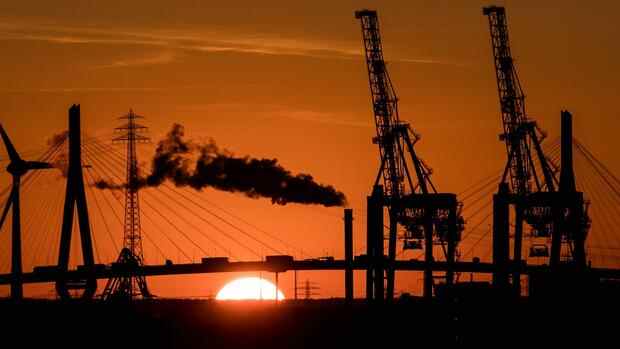The transport chain for hydrogen from the UAE to Germany was to be tested with the delivery.
(Photo: imago images/Manngold)
Berlin The development of a hydrogen value chain between Germany and the United Arab Emirates (UAE) is taking shape: A first hydrogen test delivery from Abu Dhabi has reached the Port of Hamburg. The delivery was agreed during the trip by Federal Economics Minister Robert Habeck (Greens) to Abu Dhabi in March.
The Federal Ministry of Economics sees the test delivery as an “important step for the intended development of a comprehensive hydrogen value chain between Germany and the UAE”.
The hydrogen was supplied by the state-owned Abu Dhabi National Oil Company (ADNOC), and it is handled by the logistics company Hamburger Hafen und Logistik AG. The customer is the copper producer Aurubis.
ADNOC supplied the hydrogen in the form of the derivative ammonia. Hydrogen is converted into ammonia for transport purposes because the direct transport of hydrogen by ship is very expensive. In contrast, ammonia logistics has been tried and tested for decades. The ammonia can be used directly, for example in the chemical industry. It can also be converted back into hydrogen.
Top jobs of the day
Find the best jobs now and
be notified by email.
In the case of the test delivery from Abu Dhabi, Aurubis wants to use the ammonia for test runs for the climate-neutral conversion of gas-intensive copper wire production in order to replace fossil fuels in the long term.
The aim is to import green hydrogen
According to the Federal Ministry of Economics, the ammonia was produced on the basis of so-called “blue hydrogen”. We are talking about blue hydrogen when the CO2 released during the conventional production of hydrogen by means of steam reforming is separated and stored (carbon capture and storage, CCS for short).
Blue hydrogen is considered a transitional technology. The aim of the Federal Ministry of Economics is to import green hydrogen to Germany in the medium term with the help of partnerships.
Abu Dhabi also has the prerequisites for the production of green hydrogen. If hydrogen is produced by electrolysis and the electricity used comes from renewable sources, this is called green hydrogen. It is climate-neutral and is considered the key to decarbonizing industrial processes. Electrolysis uses electricity to separate water into hydrogen and oxygen.
The steel and chemical industries are very interested in sourcing green hydrogen in large quantities in the coming years. The federal government is helping. One instrument for building hydrogen value chains are partnerships with countries that have good conditions for hydrogen electrolysis.
These include in particular countries in sunny and windy regions of the world, because inexpensive electricity from wind turbines or photovoltaic systems is a basic requirement for the production of green hydrogen.
Germany wants to cover hydrogen demand
A cooperation agreement was concluded between Hamburger Hafen und Logistik AG and ADNOC to test the transport chain for hydrogen from the UAE to Germany. The state of Hamburg accompanies and supports the test delivery project in an advisory and organizational capacity.
The delivery was agreed during the trip by Federal Economics Minister Robert Habeck (Greens) to Abu Dhabi in March.
(Photo: IMAGO/Frank Ossenbrink)
Germany and the UAE work closely together in the areas of hydrogen and renewable energies as part of the Emirati-German energy partnership initiated in 2017.
Under the umbrella of the energy partnership, a bilateral task force for hydrogen and synthetic fuels was founded in November 2021 to strengthen cooperation between companies, research institutions and politics.
With hydrogen deliveries, Germany wants to cover the increasing demand, which the federal government estimates at 90 to 110 terawatt hours for 2030. In 2020, 57 terawatt hours of hydrogen were consumed in Germany. The vast majority of these were produced using steam reforming based on natural gas, coal or petroleum. It is therefore so-called “grey hydrogen”, which is not climate-neutral.
More: Germany could obtain hydrogen from these countries in the future
